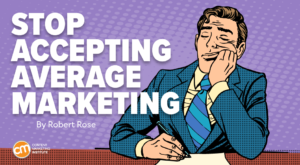
This debate seems to be as old as the concept of sales…and many things in life, but we will keep it to sales and marketing for the purpose of this article.
Many I speak with will fall solidly in the “quality” camp. In fact, I guess that for many of you reading this, your answer might be quality. Some of you might answer “both” just because you know me and how I like to set up a topic.
But, deep down inside, we probably think about quality as the winner of the debate.
…and to a large extent, there is truth to this.
That said, if you’ve “grown-up” in any serious sales environment, you may sit on the other side of the equation. And while you may not agree with anything else he ever said, you might think that Joseph Stalin was onto something when he stated, “quantity has a quality of its own.”
When I started my sales career 25 years ago, I worked for Morgan Stanley Dean Witter. In that environment, you were handed a phone book, sat down in front of a phone, and told to start dialing—often with no training other than what you picked up during licensing. If you’ve ever seen the movie Boiler Room, you have a good sense of my early days. The premium was on quantity, not necessarily quality.
This, too, was a practical approach. That was then. What about now?
The Debate Is Wrong

The debate about quality versus quantity is wrong. You can’t possibly decide on one versus the other in the discussion. Ultimately, as you may have suspected, you need both—and one other element I’ll mention shortly.
So, why do you need both quantity and quality?
Many of you have worked with some sort of email marketing. How effective is it to send just one email to the database? Not very. What if it is a perfectly crafted email written by a resurrected Ogilvy or Collier? Still not very successful. And, realistically, how many of us consistently maintain an open rate of 100%? One immaculately constructed email simply isn’t going to reach everyone.
You could say the same about our approach to content on social media. What are your chances of going viral with one post and suddenly putting yourself on the map? It could happen, but I wouldn’t bet on those odds, no matter how good the video is—even in a world where a 10-year old makes $55 million a year on YouTube.
So, let’s apply this to your sales efforts. What if you were to reach out to a handful of people every few months with a top-quality value-laden message? Either you get lucky, or more likely, you end up with nothing. And yet, for many agency owners and solopreneurs I speak with, this is their “sales plan.”
Here is what I see frequently happen with salespeople and business owners alike. You put some effort into your prospecting or, more often, get a referral or two. You catch a few wins along the way, and then suddenly you are busy, and money is coming in.
Are you still prospecting? Probably not.
And therein lies the issue with the debate about quantity over quality. You need both, and it is missing a critical factor in the equation—sustained effort.
There are few overnight successes. Many reading this article are familiar with Gary Vaynerchuk. We know him as a super-successful guy with a massive following on social media. But he regularly talks about the fact that it took hundreds of videos before he had any meaningful traction.
I ran a video series for a couple of years, RightMind Mashup, and I shot 22 straight weeks of video before someone mentioned they had seen any of them. It was my brother-in-law. And while I love him, he isn’t exactly my ideal customer. It wasn’t until week 36 that I closed a sale due to the videos.
At this point, I’ve generated over $900,000 in sales from that series, but it took sustained effort and ultimately more than 70 videos. I had quality content. I needed quantity to start making a difference. But, the driving force for both elements was sustained effort.
Success Formula
Beyond needing both quantity and quality, you must give some thought to the ratio of each factor. It looks something like this:
Quality + (Quantity/X) x Sustained effort = Success
I know. Algebra might not be your favorite subject. Oddly, it was one of mine, but I digress.
The divisor, X, in the equation indicates that you need to adjust the quantity to sustain the quality. What do I mean by that?
There is no question that it is challenging to keep up a high volume of quality content over a sustained period. Unless you have a content team, it might be nearly impossible to produce content as you continue to run your business and manage clients. So, you have to adjust the quantity to sustain the quality.
When someone joins my mastermind group, they often talk about how they want to produce content every day to help boost their business. For most, this isn’t realistic.
Writers know all about “writer’s block.” Musicians have similar issues. I would imagine that every “creative” out there suffers from this at times. Trying to go from zero to daily content on a social media platform is a recipe for frustration and burnout, or at a minimum, a reduction in quality.
So, adjust the quantity so you can sustain the quality.
The same formula holds for your sales efforts. Keeping up a high volume of quality sales calls (applies to all communications: email, messenger, texts, etc.) over time is challenging if you don’t have a salesperson. As an aside, I caution business owners against hiring a salesperson too soon. They are expensive, and unless you have a rock-solid, documented sales process, you are throwing good money after bad results.
When referring to quality in your sales calls, this involves more than what you say. While that is important, most of your success depends on your consistent follow-up with prospects. Pre-pandemic, the average salesperson—and, if you are a business owner, you are a salesperson—followed up with prospects twice. In 2021? Once.
According to Hubspot, the number of calls needed to reach a prospect increased from 8 pre-pandemic to at least 18 calls since 2021.
Conclusion
In short, the quality of your sales depends on the quantity and sustainability of your follow-up. The third element, sustained effort, is the multiplier that defines the length of your success in the market.
As buyer behavior continues to evolve, our sales efforts must adapt. As a young investment guy, I could get away with the quantity approach because this is how everyone did it, and no one had Caller ID. Buyers today educate themselves online, screen calls on their mobile devices, and work from home. These circumstances change everything about how we approach prospects today.
Rather than engaging in a debate of quality over quantity, continue to maintain quality with forward sustainability —this is the key to your long-term success in business.
Rather than engaging in a debate of quality over quantity, understand that you need both in a way that you can sustain long-term. This becomes the formula for future success.






